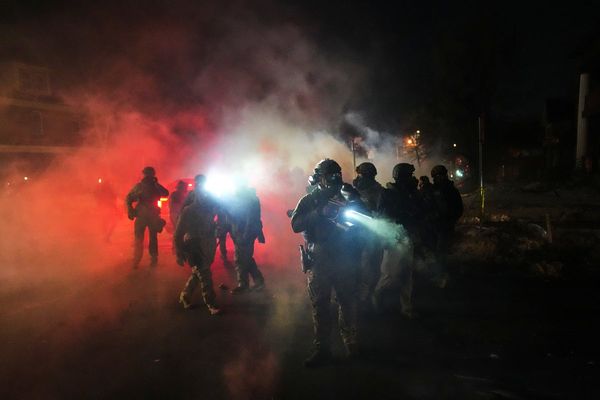
In the shadow of Google’s sprawling New York City campus, former and current Google and Amazon workers gathered on Tuesday evening to pay tribute to Mai Ubeid, a young woman and software engineer who was killed in an Israeli airstrike in Gaza along with her whole family. The workers also took the opportunity to castigate their employers for contracts with the Israeli military.
Ubeid had graduated from a Google-funded coding bootcamp, Gaza Sky Geeks, and later interned at a firm that was part of the Google for Startups accelerator program in 2020. Those who knew her have described her in written tributes and in interviews with the Guardian as a strong and determined visionary. She had muscular dystrophy and, as such, used a wheelchair to get around. Ubeid dreamed of one day developing a platform for people with disabilities to network and connect, according to Kathrine Tinggaard Nicolaisen, a former communications manager at Gaza Sky Geeks based in the West Bank who knew and had met Ubeid.
For those in Gaza, Ubeid’s life was a shining example of what a person in the besieged strip could accomplish in the tech industry if given the access and resources. “Where she was at in her life was a massive milestone for any Gazan to be able to say that they’d achieved,” Nicolaisen said.
For Google workers, Ubeid’s killing was another reminder of their employers’ $1.2bn contract to provide the Israeli government and military with cloud and machine learning services, codenamed Project Nimbus. Many Google workers have spent the last two years protesting, arguing their employer is providing tools that aid what human rights groups call apartheid imposed on Palestinians by Israel. Despite worker efforts to bring more attention to Ubeid’s killing, the company has so far declined to publicly or internally acknowledge her death, according to several employees who spoke at the vigil. For Mohammad Khatami, a Google software engineer and one of the organizers of the vigil, the silence of the company and the chief executive, Sundar Pichai, on Ubeid’s death “is a betrayal in the purest sense of the word”.

“No email, no difficulty, no decision, not public statement and absolutely no shame,” Khatami said at the Tuesday vigil just outside Google’s offices. “Shame on [Pichai] and shame on Google.”
A Google spokesperson, Courtenay Mencini, declined to respond to direct questions about the company’s lack of acknowledgment of Ubeid’s death but said that this was a “highly sensitive time and topic in every company” and that Google had “many employees who are personally affected”.
“The overwhelming majority of those employees are not engaged in internal discussions or debate, and many have said they’ve appreciated our fast response and our focus on the safety of our employees,” Mencini said.
Mencini also said the company’s Nimbus contract only provides “commercial” services for Israeli government ministries including finance, healthcare, transportation and education – not for “highly sensitive or classified military workloads relevant to weapons or intelligence services”. However, when announcing the contract with Amazon and Google, Israel’s finance ministry told Haaretz the companies would be providing cloud solutions to the government and “the defense establishment”. The company declined to respond to follow-up questions about why Israel’s government has described the nature of the contract in different terms.
About 50 people gathered in the small park flanked by the Hudson River and the Google-owned Chelsea market building. Google and Amazon workers, including those behind the No Tech for Apartheid campaign, were joined by representatives from Palestinian advocacy groups such as Jewish Voice for Peace and Within Our Lifetime. A banner that urged Google and Amazon to drop Project Nimbus was held up alongside a table with a poster celebrating Ubeid’s life. “Engineer. Daughter. Creator. Software Engineer in Google-Backed Internship. Martyred in Israeli Airstrike,” the poster read, referring to Ubeid with the Arabic word “shaheed”, commonly translated to “martyr” but meaning something closer to “witness”.
The vigil was held just weeks after Khatami said he was singled out by Google human resources for circulating an anonymous open letter from employees that said Project Nimbus was contributing to Israel’s human rights abuses against Palestinians. Khatami was among a number of Google workers who circulated the email internally, which cited Israel’s ongoing bombardment of the Gaza strip and said Google could become “complicit in what history will remember as a genocide”, according to the Intercept. However, Khatami, the only Muslim among those circulating the email, said he was the sole worker called into HR.
Khatami told the Guardian he was asked whether he thought his words could be seen as a justification for the 7 October Hamas attacks on southern Israel. “The idea that I even have to qualify my humanity to say that I don’t condone the killing of innocent people points to some sort of racism,” he said in an interview with the Guardian before the vigil. “But even then, I’ve gone out of my way to make it clear that no violence against innocent people is acceptable. We were just explaining, ‘Hey, Google’s complicit in this occupation, and if we want the violence to end, we have to go to the root cause of it.’”

Google’s Mencini did not go into specific details about whether Khatami was singled out but said the company follows up on every employee concerned raised “and in this case, dozens of employees reported this individual’s email – not the sharing of the petition itself”.
Khatami and other workers say they don’t feel safe speaking up in support of Palestinian human rights, calling Google executives’ response to the thousands of civilians who have been killed in Israeli airstrikes inadequate. Just last year, Ariel Koren, a former Google employee, said the company retaliated against her by trying to force her to transfer to Brazil after she organized employee-led actions against Project Nimbus. Koren later quit but still works with the No Tech for Apartheid campaign.
Lourdes Rohan, an associate product marketing manager at Google, read a speech at the vigil from a reverend who could not attend, plastic Google employee badge still hanging from a belt loop. Rohan, who uses they/them pronouns, disagreed with the company’s involvement in Project Nimbus, a position they stressed was “my own feelings”. Rohan said they haven’t received a message about Ubeid’s death, an example, they said, of a dearth of internal discussion of the conflict and space to express grief for its casualties. They said Google has worded its responses to the conflict “like politicians” to carefully not seem one-sided. They have worked in the company’s Chelsea offices for a year and a half after graduating from Yale.
Attending the vigil and speaking up probably put their job at risk, they said. “I’ve been told to be afraid, like people say, ‘Oh, you don’t want to lose your job,’ but I know what I stand for, I know who I am, and if calling for the end to a genocide is going to get me fired, that will just be a way for me to come to a job that more aligns with my values. Other people may not feel the same way. Obviously I don’t want to be fired. I’ll be OK,” they said.
Zelda Montes, a software engineer at YouTube, came to the vigil both to demonstrate their disagreement with Project Nimbus and because they felt a kinship with Ubeid. Montes had participated in similar intern programs as the young Palestinian coder. They felt nervous speaking out and attending the event because they are the first in their family to graduate from college, they said, but decided the cause was too important.
“Mai’s name will always be remembered with honor and power and blessings and love,” Khatami said at the end of his speech. But he urged Google to “stay consistent” with its own stated values of “don’t be evil”.







